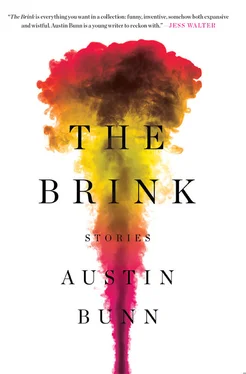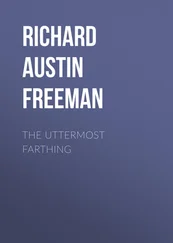“Well, I’m not a monster,” Barr said. “Whatever your friends say.”
“They’re not my friends,” Kyle said.
“And the hospital? Are they taking care of him?” Barr drained his drink.
“I don’t know. His mother doesn’t want me there.”
Squirrel’s mother had, in fact, hated him instantly. She lashed at him, as though he were to blame, and yet he was — by anyone’s measure — the furthest from it. “Stay away from my son,” she’d said in the hospital parking lot where he’d gone to greet her, and then promptly barred him from the room where Squirrel lay prone and silent. None of the Mountain Justice League had sided with him, the gay boyfriend, the outlier. Instead, they drew a perimeter of care around Squirrel that didn’t include him, didn’t include that kind of justice. When she turned away, he saw the patch for a horse farm emblazoned across the back of her denim jacket. It was definitively, and Squirrel would have appreciated this, off-message.
So Kyle had decided he would not let them exploit the accident for their gain. He’d taken Squirrel’s keys, visited the Justice League offices that morning, and absconded with the briefcase.
“He’s from Pikeville,” Kyle said.
“Ah, the rural East,” Barr said. “You’ll have to be patient with her.”
“She doesn’t know who he is.”
Kyle looked over at Barr. His rumpled dress shirt and red mesh sports shorts made him seem half undressed already. Judging by the topography, Kyle was pretty sure he was free-balling. Barr had the ferocious calves of a shot-putter — a coachlike solidity that Kyle would never admit stirred him. Barr had shaved his head down to a fringe of black hair, and his face had a serene, almost baked quality from years of comfortable executive living or a long drip of hard alcohol. But a loneliness pervaded the house, a single man in a mansion.
Barr stared back and Kyle detected a not-unfamiliar searching, undefended quality. Since Kyle had moved to Kentucky — the only person he knew to move there and not grow up there, like some hothouse flower — he’d come to know that a goodly portion of the gay men in Kentucky were, in fact, married to women. It was a Southern fact. He’d met them at bars with their rings on . The contradiction was part of their appeal, maybe all of it — Lord knows, the pleated pants were not. He even had gay friends back in Philly who advertised online as straight and married because it worked. Men wanted a challenge, a conquest, terrain where they could plant a flag.
“So you’re not an activist?” Barr asked. “What’s your line of work then?”
Kyle had several answers to this, but the honest one was staring at the ceiling, trying to will a professional life into being. His relationship with Squirrel had introduced him to penniless activists who were not impressed by full-bleed layouts. They’d rather xerox a xerox, samizdats for a cool war, and look at him with pity. At least in Philly he’d designed album covers, websites for nonprofits, and if he wasn’t paid well or wasn’t paid at all, at least they’d been grateful. The looming truth was that he’d have to reboot: move back to Philly and be broke there.
“I’m between jobs,” Kyle answered. “And let’s put jobs in quotes.”
Barr said then that he wanted to propose something, and that if Kyle didn’t like what he heard, he could get up and go and there would be no consequences. This was the opening Kyle could see coming miles away. It didn’t shock him. Not anymore. Not living in the northernmost Southern state, where gentlemen preferred their piece on the side to be preppy, discreet. He drained his glass and smiled to himself in the dark.
“I have a job for you,” Barr said. “And Kyle, listen, you could be a real game-changer.”
5.
The arrangement was this: the boy would return on Saturday afternoon to mow the back lawn, some demonstrable work for the pay. But it was after that Leland waited for, when he would make them a drink, they would sit in the mottled light of the gazebo, and the young man would report back on the meetings of the Mountain Justice League.
At first, Kyle was cagey and hesitant. He wasn’t sure what Leland wanted to know, or why, and the details he offered were digressive, more color than anything. Like the injured boy’s progress — he remained in the rehab unit of the hospital, struggling to regain his speech. Or the various fund-raising farragoes: an upcoming occupation of a city park, or the decision to raise money for a single mother in a godforsaken hollow who had run afoul of the banks. Leland didn’t care about good works. He wanted to understand the bull’s-eye — who drew it, where it would be. The leading edge of their campaigns. Kyle left with cash, two hundred dollars a visit. After the first time, Leland wasn’t sure the boy would return. But then, there he was the following Saturday at four, in a baseball cap, headphones in his ears. And again the next Saturday, when he asked for two hundred and fifty, and Leland did not balk.
“You realize they’re just kids,” Kyle said, folding the money into the breast-pocket of his shirt. “I could tell you about the lentil-loaf recipes and twinkle hands for consensus. But I’m pretty sure you don’t give a shit.”
Leland did not. But he had, without knowing it, come to anticipate this time. The utter improbability: a young stranger, feet up on a rattan ottoman like he owned the place, sharing a drink with him in the shade. Leland’s world had become a strict dial of interactions — his secretary’s chilly regard, an unseen lawyer faxing him divorce paperwork, and site managers reporting in — none of which provoked him in any discernable direction. His physician had told him to smile if no other reason than it softened the ventricles of the heart. So Leland smiled.
Leland said, “I’ve come to see you as a friend.” Was that true? It was. The young man was his only regular company.
“Do you pay all your friends?” Kyle asked.
“I think we pay each other in different ways.”
Kyle stretched his back with his hands planted at the top of his ass. A sort of bowing, throwing his midriff forward, pulling his shirt up at his waist, revealing the smooth, carved joint at the top of his thigh. It was a move that heterosexual men did not, could not, do. A strange stirring alit inside Leland. It had been months since he had been touched, his body a map he skipped over: the ridgeline of hair on his shoulder that Merrill had once asked him to shave, his belly that bulged like a dumpling. . What did the boy see? He tried and the image was blank.
“Restroom?” Kyle asked.
Leland pointed at the back door.
“Or can I pee outside like a wild animal?” His eyes were unwavering, drawing something from Leland.
“Feel free,” Leland said. The boy grinned and slipped his feet back his shoes. A performance was beginning, and Leland discovered he was a willing audience. Kyle opened the screen door and paused.
“Hey, so, what is the Dominion Project?” Kyle said. “They mentioned it at the meeting. Something Origin was trying to do. Buy up a whole bunch of mountains. That King was just the first.”
Leland circled the ice in his glass. An insect drowned at the bottom. How had it made its way in? The gazebo was screened.
“It’s better if you know less,” Leland said.
How much he, too, would rather know less. Origin Resources intended to dragline a significant portion of Lawrence County’s choicest seams; he would like to unknow that. The spoil rock they sent into streams was not harmless, incidental. The numbers were not good numbers. As a boy, Leland once imagined he would become a veterinarian, a savior to the animals — the kind of thing you imagined yourself as but never being, master of the vital operations and desperate rescues of what we actually love. Instead, he knew extraction.
Читать дальше











